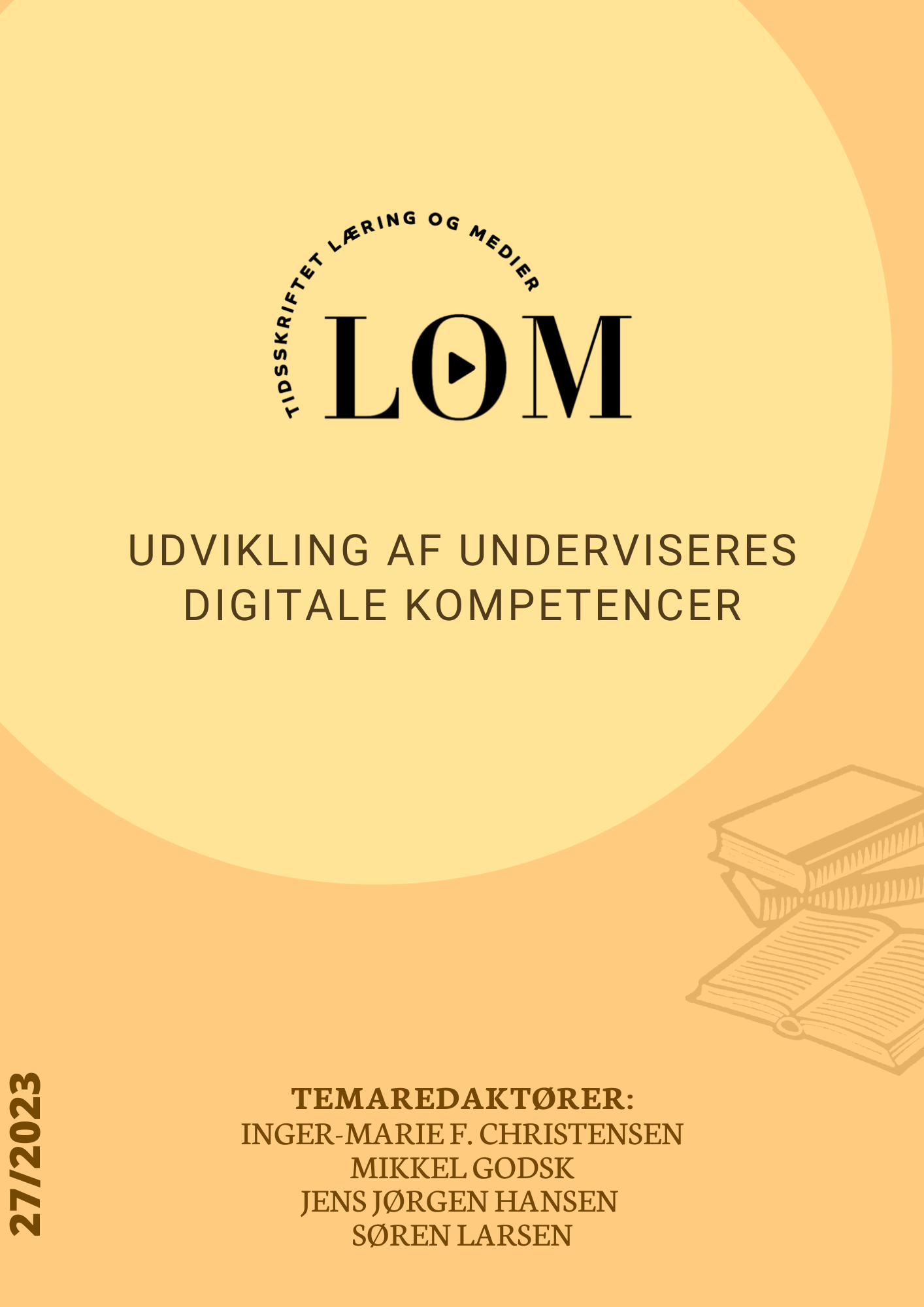Updated competencies in project digital learning circles
A study on higher education educators' experiences of developing digital teaching skills
DOI:
https://doi.org/10.7146/lom.v15i27.134280Abstract
This article presents a study of the social practice and learning outcomes that emerged during a course on developing digital competencies. The course is part of a project called ‘Digital Learning Circles’. Based on empirical data from the project, this article examines which competencies educators from three higher education institutions experience to have developed during their participation in the course. The course is designed as a learning cycle that focuses on developing digital competencies for education. The study is a mixed methods study, including both quantitative data from a survey (n=96) and qualitative data from interviews with four participants. The study investigates indications of new pedagogical practices and digital opportunities for developing the participants’ practice revealed in the empirical data. The article contributes to the research field of Continued Education for educators, and it presents knowledge about the pedagogical and digital skills the participants’ experience to have developed in connection with the course. It shows that even though a course on the development of educators’ digital skills and competencies has a strong focus on developing digital skills, the general pedagogical aspects of education become the focal points of the participants’ dialogues and that affects the experienced learning outcome.
Downloads
References
Amdam, S., Kobberstad, L. R., & Tikkanen, T. I. (2022). Professional digital competence in strategy and management: A case study of three teacher education programs in Norway. Nordic Journal of Digital Literacy, (1), 16-30.
Basilotta-Gómez-Pablos, V., Matarranz, M., Casado-Aranda, L. A., & Otto, A. (2022). Teachers’ digital competencies in higher education: a systematic literature review. International Journal of Educational Technology in Higher Education, 19(1), 1-16.
Brinkerhoff, R. O., & Apking, A. M. (2001). High impact learning: Strategies for leveraging performance and business results from training investments. Westview Publishing.
Bryman, Alan. 2016. Social Research Methods. Oxford: Oxford University Press
Falloon, G. (2020). From digital literacy to digital competence: the teacher digital competency (TDC) framework. Educational Technology Research and Development, 68(5), 2449-2472.
Flyvbjerg, B. (2010). Fem misforståelser om casestudiet (Five Misunderstandings about Case-Study Research). Kvalitative metoder, København: Hans Reitzels Forlag, 463-487.
Greene, Jennifer C. 2007. Mixed methods in social inquiry. San Francisco: Jossey-Bass.
Heuling, L. S., Wild, S., & Vest, A. (2021). Digital Competences of Prospective Engineers and Science Teachers: A Latent Profile and Correspondence Analysis. International Journal of Education in Mathematics, Science and Technology, 9(4), 760-782.
Joshi, M. S. (2021). Holistic design of online degree programmes in higher education–a case study from Finland. International Journal of Educational Management.
Kemmis, S., Wilkinson, J., Edwards-Groves, C., Hardy, I., Grootenboer, P., & Bristol, L. (2013). Changing practices, changing education. Springer Science & Business Media.
Lave, J., & Wenger, E. (1991). Situated learning: Legitimate peripheral participation. Cambridge university press.
Leahy, D., & Dolan, D. (2010). Digital literacy: A vital competence for 2010?. In IFIP international conference on key competencies in the knowledge society (pp. 210-221). Springer.
Nielsen, L. T. (2012). Teamsamarbejdets dynamiske stabilitet. En kulturhistorisk analyse af læreres læring i team. Ph.d.-afhandling, Århus Universitet
Pangrazio, L., Godhe, A. L., & Ledesma, A. G. L. (2020). What is digital literacy? A comparative review of publications across three language contexts. E-learning and Digital Media, 17(6), 442-459.
Rattleff, P., & Henriksen, T. D. (2010). Kortlægning af it-kompetenceudviklingsmuligheder i det ikke-formelle it-undervisningssystem for voksne i Danmark.
Redecker, C. (2017). European Framework for the Digital Competence of Educators: DigCompEdu. https://doi.org/10.2760/159770
Schwartz-Shea, P., & Yanow, D. (2013). Interpretive research design: Concepts and processes. Routledge.
Sillat, L. H., Tammets, K., & Laanpere, M. (2021). Digital competence assessment methods in higher education: A systematic literature review. Education Sciences, 11(8), 402.
Verhoeven, J. C., Heerwegh, D., & de Wit, K. (2014). ICT learning experience and research orientation as predictors of ICT skills and the ICT use of university students. Education and Information Technologies, 21, 71–103. https://doi.org/10.1007/s10639-014-9310-3
Wenger, E. (1998). Communities of practice: Learning as a social system. Systems thinker, 9(5), 2-3.
Wenger, E., White, N., & Smith, J. D. (2009). Digital habitats: Stewarding technology for communities. CPsquare.
Yin, R. K. (2018). Case study research and applications. Sage.
Zhao, Y., Llorente, A. M. P., & Gómez, M. C. S. (2021). Digital competence in higher education research: A systematic literature review. Computers & Education, 168, 104212.
Downloads
Published
How to Cite
Issue
Section
License
Copyright (c) 2023 Hanne Fie Rasmussen, Thomas Kjærgaard, Christian Black Jørgensen

This work is licensed under a Creative Commons Attribution-NonCommercial-NoDerivatives 4.0 International License.

Articles published in the Journal of Learning and Media are licensed under a Creative Commons Attribution-NonCommercial-NoDerivatives 3.0 Unported Licens.
Authors retain copyright and grant the journal right of first publication; simultaneously articles are licensend under the Creative Commons Attribution license: Attribution-NonCommercial-NoDerviatives (by-nc-nd). Read about this license at https://creativecommons.org/licenses/by-nc-nd/3.0/
---
At LOM.dk, you will also find articles from the discontinued Journal for the Continuing and Further Education of the Danish Universities (UNEV). Note that special rules apply to UNEV articles:
It is the authors and any other copyright holder who have the copyright of articles published under the auspices of UNEV, and access to the articles is contingent on users acknowledging and complying with the associated legal guidelines:
- Users may download and print one copy of any UNEV publication for private studies or research.
- The redistribution of articles or the use of these for revenue-funded activities or commercial purposes are not allowed.
- It is not allowed to distribute the URLs of UNEV articles.


